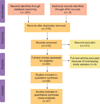The problem of Helicobacter pylori resistance to antibiotics: a systematic review in Latin America
- PMID: 24589670
- PMCID: PMC4268863
- DOI: 10.1038/ajg.2014.24
The problem of Helicobacter pylori resistance to antibiotics: a systematic review in Latin America
Abstract
Objectives: Latin America has a high prevalence of Helicobacter pylori infection and associated diseases, including gastric cancer. Antibiotic therapy can eradicate the bacterial infection and decrease associated morbidity and mortality. To tailor recommendations for optimal treatments, we summarized published literature and calculated region- and country-specific prevalences of antibiotic resistance.
Methods: Searches of PubMed and regional databases for observational studies evaluating H. pylori antibiotic resistance yielded a total of 59 independent studies (56 in adults, 2 in children, and 1 in both groups) published up to October 2013 regarding H. pylori isolates collected between 1988 and 2011. Study-specific prevalences of primary resistance to commonly prescribed antibiotics were summarized using random-effects models. Between-study heterogeneity was assessed by meta-regression. As a sensitivity analysis, we extended our research to studies of patients with prior H. pylori-eradication therapy.
Results: Summary prevalences of antimicrobial primary resistance among adults varied by antibiotic, including 12% for clarithromycin (n=35 studies), 53% for metronidazole (n=34), 4% for amoxicillin (n=28), 6% for tetracycline (n=20), 3% for furazolidone (n=6), 15% for fluoroquinolones (n=5), and 8% for dual clarithromycin and metronidazole (n=10). Resistance prevalence varied significantly by country, but not by year of sample collection. Analyses including studies of patients with prior therapy yielded similar estimates. Pediatric reports were too few to be summarized by meta-analysis.
Conclusions: Resistance to first-line anti-H. pylori antibiotics is high in Latin American populations. In some countries, the empirical use of clarithromycin without susceptibility testing may not be appropriate. These findings stress the need for appropriate surveillance programs, improved antimicrobial regulations, and increased public awareness.
Conflict of interest statement
Figures
References
-
- Ford AC, Delaney BC, Forman D, et al. Eradication therapy for peptic ulcer disease in Helicobacter pylori positive patients. Cochrane Database Syst Rev. 2006;(2) CD003840. - PubMed
-
- Zullo A, Hassan C, Cristofari F, et al. Effects of Helicobacter pylori eradication on early stage gastric mucosa-associated lymphoid tissue lymphoma. Clin Gastroenterol Hepatol. 2010;8:105–110. - PubMed
-
- Fischbach L, Evans EL. Meta-analysis: the effect of antibiotic resistance status on the efficacy of triple and quadruple first-line therapies for Helicobacter pylori. Aliment Pharmacol Ther. 2007;26:343–357. - PubMed
Publication types
MeSH terms
Substances
Grants and funding
LinkOut - more resources
Full Text Sources
Other Literature Sources
Medical
Research Materials


